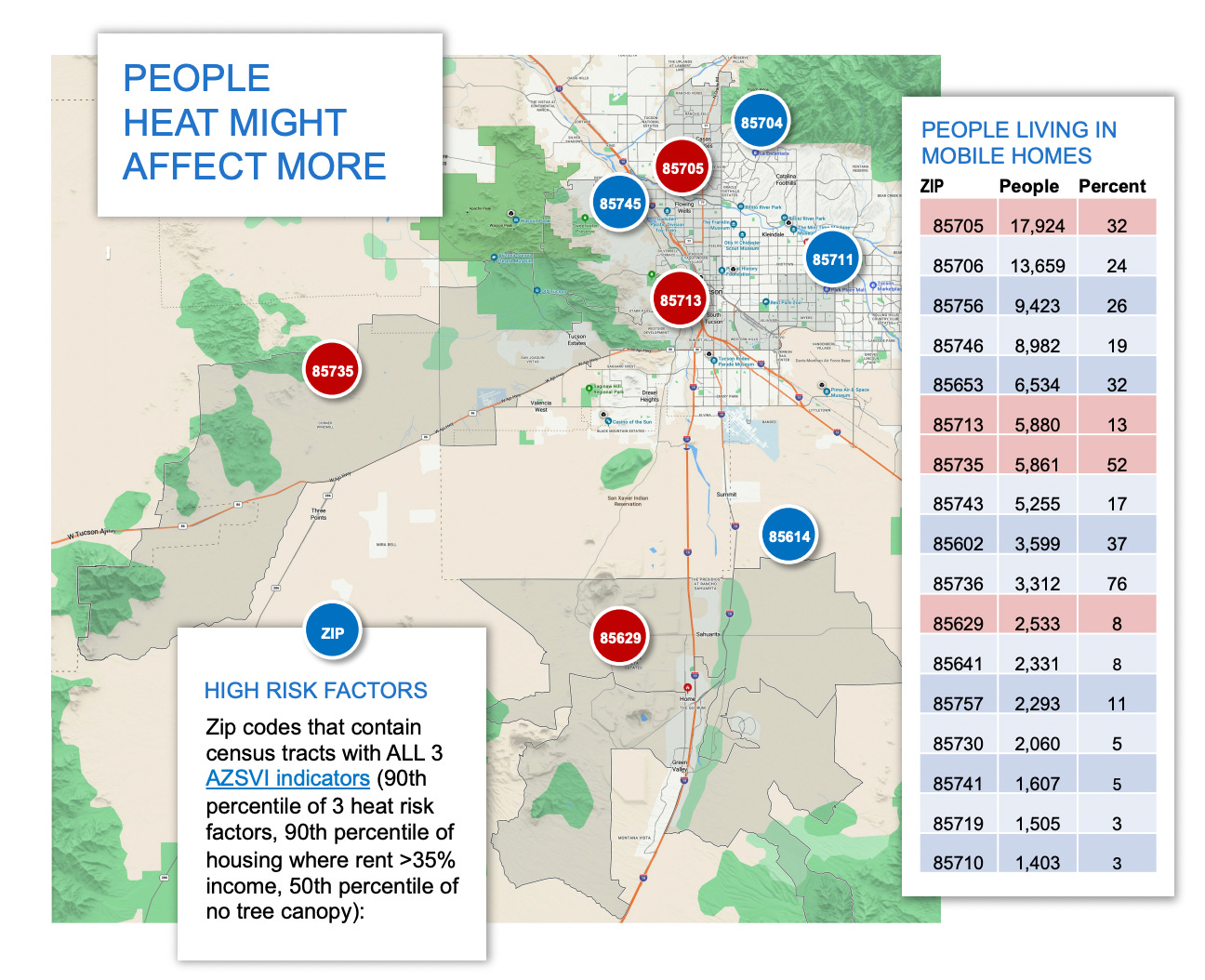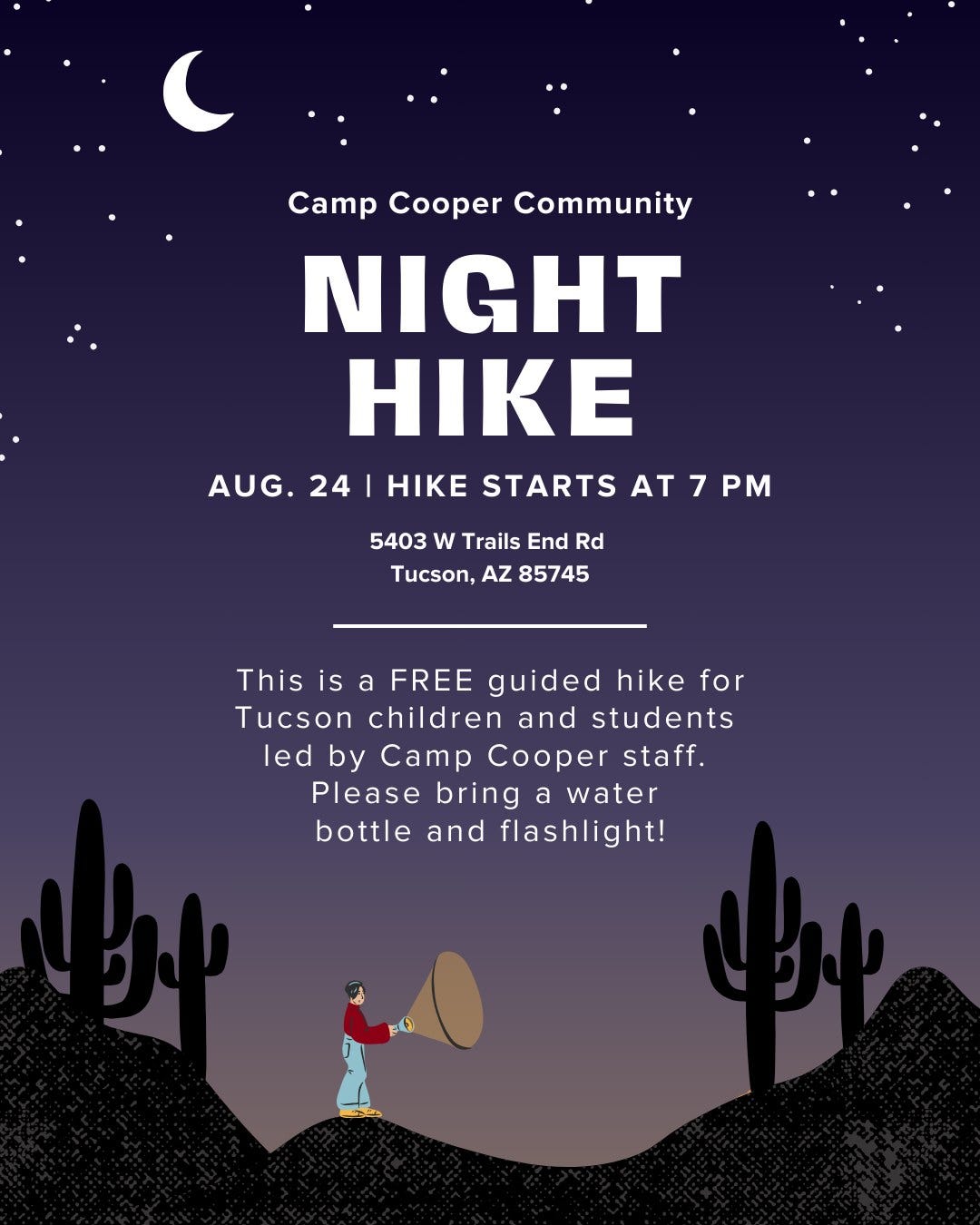The Climate Agenda: Can't take the heat
Pima just became the first county in the state to adopt a heat safety plan ... The ordinance will protect 7,000 employees and thousands of contractors ... Trump visits the border.
As a new reporter, there were few things Caitlin dreaded more than being sent to a crime scene in the middle of the summer.
These are tough situations to cover, in addition to the obvious tragedy. We were lucky when media staging areas were shaded, and we often were stuck waiting for hours for public information officers to get approval to share even the most basic of details.
So, imagine if it was your job to stand outside for hours every day during those summer months, as it is for thousands of workers in Southern Arizona.
That’s why county officials are taking action to protect staff and contracted workers from heat illness and more, becoming the first county in the state to adopt a heat safety ordinance.
Supervisors approved the plan earlier this week, which requires all county workers and contracted employees have access to cool water, shade and regular breaks during their shifts.
The ordinance, which will take effect in 30 days, passed by a vote of 4-1, with Supervisor Steve Christy as the lone “no” vote. He complained during the meeting that he believed this was the first step to the county requiring private business owners to take similar measures.
But if the federal government has its way, that’s exactly what will happen.
Last month, the Occupational Safety and Health Administration released its Proposed Rule for Heat Workforce Safety, which would establish the nation’s first-ever federal safety standards for heat protection and require that local governments develop a “Heat Injury and Illness Prevention Plan.”
While the OSHA guidelines are only recommendations at this point, should they become the standard, the county is good to go, since its heat ordinance aligns with the core tenets of the OSHA proposed rule, according to County Administrator Jan Lesher.
“(The OSHA regulation) will apply to all employers, and it should, not only because of the increasingly warming world that we are dealing with as the result of scientifically-proven climate change, but also because we have an obligation to protect workers,” Supervisor Rex Scott said during the meeting. “There isn’t some kind of long-term game plan on behalf of the board, but there certainly is a long-term game plan on behalf of the OSHA, and I hope it plays out.”
The policy will protect roughly 7,000 county employees and thousands of contractors and vendors and applies to all worksites.
Tuesday’s vote came after months of public discussion and outreach, with county officials soliciting feedback from the business community and members of the public.
Thirteen of the fourteen letters it received during the public comment period were in support of the ordinance, with many including suggestions for clarifications or changes to the language. Arizona Attorney General Kris Mayes even weighed in on the ordinance, offering a few recommendations of her own, as well as praise.
“Pima County is at the forefront of Arizona counties extending heat-related protections to workers covered by the ordinance,” Mayes wrote. “Extreme heat can be particularly perilous for employees working long hours outdoors, engaging in heavy or vigorous physical work, or wearing protective clothing or gear while working.”
The lone letter opposing the ordinance was written by a 35-year resident of Tucson who found the measure to be unnecessary and called it “feel good legislation.”
“We live in the desert and it’s hot. Everybody knows this,” the letter said. “The workers and their supervisors surely know best how to take care of themselves in this weather. We don’t need another silly law”
The letter writer suggested the county instead create a training seminar that could be used at the beginning of “hot season,” saying that even that would likely be “snickered at and resented by” county employees.
But that’s debatable, since a handful of letters submitted during the public comment period asked for comprehensive trainings on the new plan.
During Tuesday’s meeting, Supervisor Adelita Grijalva, who first proposed the ordinance back in May, said she was proud to be leading the state and to have created a plan that can serve as a model for other communities.
“Statistics and observations show that our summers are getting hotter and hotter, resulting in deaths and hospitalizations,” Grijalva said. “It is time for us to act and we have done so.”
Stonewall city: After news broke about the conflict of interest at Casa Alitas, U.S. Rep. Juan Ciscomani asked the Office of the Inspector General for Homeland Security to investigate how federal funds were used to support asylum seekers in Tucson, the Tucson Sentinel’s Paul Ingram reports. County officials are dragging their feet on releasing records or answering the Sentinel’s questions about the issue, and have still not responded to a records request for details about how the county learned and dealt with the problems filed nearly two months ago.
Game-changer: Tucsonans can recycle greasy pizza boxes now, the Arizona Daily Star’s Charles Borla reports. City officials say as long as the boxes are relatively clean and there’s no leftover pizza in them, residents can throw them in their blue recycle bins. The change came after officials learned grease on pizza causes little contamination in the recycling process. City officials announced the change on social media last week.
Keeping the peace: The Campus Community Relations Committee is a key player in peacekeeping efforts between the University of Arizona and neighborhood associations around campus, KGUN’s Athena Kehoe reports. The group is made up of representatives from the UA and neighborhood associations and meets once a month. UA spokesman Mitch Zak says that being a part of an organized effort is important to help share ideas, seek feedback and make adjustments to make sure that small issues don’t turn into big problems.
Accessible care:: Pima Animal Care Center’s non profit fundraising partner will be turning a former veterinary office on North 1st Avenue into a nonprofit, low-cost animal care clinic, the Sentinel’s Natalie Robbins writes. The clinic, operated by Friends of PACC, will be available to anyone who adopted an animal from PACC, anyone receiving government assistance who needs spay and neuter services and families that receive support through PACC’s Pet Support Center.
“Both the lack of access and the rising cost of veterinary care have been significant factors contributing to the overpopulation problems at PACC,” said Executive Director Torre Chisholm, who added that 30% of the pets surrendered to PACC are due to their owners’ inability to access or afford vet care.
A joint effort: The Cochise County Sheriff’s Office coordinated with the Sierra Vista Police Department, Arizona Department of Public Safety, Secret Service and more to prepare for former president Donald Trump’s visit to the border yesterday, Arizona Public Media’s Danyelle Khmara reports. Cochise County Sheriff Mark Dannels told Khmara that he’d be speaking with Trump during the tour about the public safety challenges and impact of the border on neighboring communities.
Bigger and better: Tucson Comic-Con is coming back for its 15th anniversary this month, This is Tucson’s Sierra Blaser reports. Since the event launched in 2008, attendance has grown from about 500 visitors to 22,000 last year. And it’s not just comic book fans anymore. The event runs from Aug. 30 through Sept. 1 at the Tucson Convention Center and will feature more than 200 vendors and 50 guests, including “Cheers” and Pixar actor John Ratzenberger.
If you’d like your group’s event featured in a future edition of the Climate Agenda, please send details to caitlin@tucsonagenda.com.
Las Milpitas Community Farm open house
Join the Community Food Bank of Southern Arizona tomorrow at 10:30 a.m. for a free open house at Las Milpitas Community Garden. Learn about the garden’s volunteer opportunities, free monthly education workshops and no-cost seedlings during fall and spring planting seasons. The open house will include a tour of the farm, including information about its history, and an introduction to staff and gardeners. Attendees will learn how to apply for their own plot and about the upcoming fall workshop schedule. Light refreshments will be served. The even is aimed at people who live within a 3-mile radius of the farm and people who are at or below the federal poverty level. For more information, contact Grace Saavedra or click here.
Night hike at Camp Cooper
The Cooper Center for Environmental Learning is hosting an educator-led night hike tomorrow at 7 p.m. at Camp Cooper (5403 W. Trail’s End Rd.) The event is free and open to all Tucson kids and students as part of Camp Cooper’s 60th anniversary celebration. The Cooper Center sits on 10 acres of Sonoran desert land and is located 7 miles west of downtown. Parents are asked to join in or stay on-site for the duration of the hike. Attendees should bring water bottles, flashlights and a black light for scorpion hunting. Find more details and register here.
Beat down buffelgrass in Tucson Mountain Park
Join the Sonoran Desert Weedwackers and Pima County Conservation Lands and Resources Wednesday from 6 to 9 a.m. for a morning of buffelgrass removal in Tucson Mountain Park. Volunteers should be comfortable with hiking and come prepared to hike off trail and work in the heat. Details about the specific meeting location within the park will be sent by email a few days ahead of time. Snacks and drinks will be provided at the end. Volunteers should wear hiking boots or sturdy shoes and long pants, and bring water and sun protection. Tools will be provided. Learn more and register here.
Rain water and greywater harvesting basics
Join the Watershed Management Group for a pair of in-person and virtual water harvesting classes. On Tuesday, Sept. 3 at 5 p.m., the group will be hosting an online greywater harvesting class that will introduce attendees to potential opportunities for using greywater in landscape, greywater harvesting best practices, a virtual tour of greywater features at the Living Lab, and information about qualifying and applying to the Tucson Water Greywater Incentive program. On Wednesday, Sept. 4, the group is hosting an in-person water harvesting skills class at its Living Lab (1137 N. Dodge Blvd.) Instructors will teach attendees about passive and active rainwater harvesting and how to qualify and apply for Tucson Water's Rainwater Harvesting Incentives Rebate Program. Learn more and register here.











If Steve Christy doesn't believe in protecting workers from the heat, he should work the noon shift at Dutch Brothers Coffee on Speedway. Their workers are standing outside in full sun next to idling cars, while taking orders on a tablet. Not only do they not have shade, hats or uniforms with long sleeves, corporate has given them the most inefficient device to use in the sun -- an electronic tablet. When I saw your headline, I thought you were referring to all workers, not just county workers.